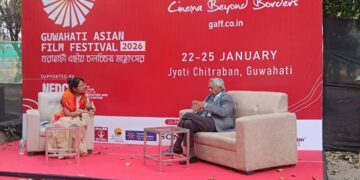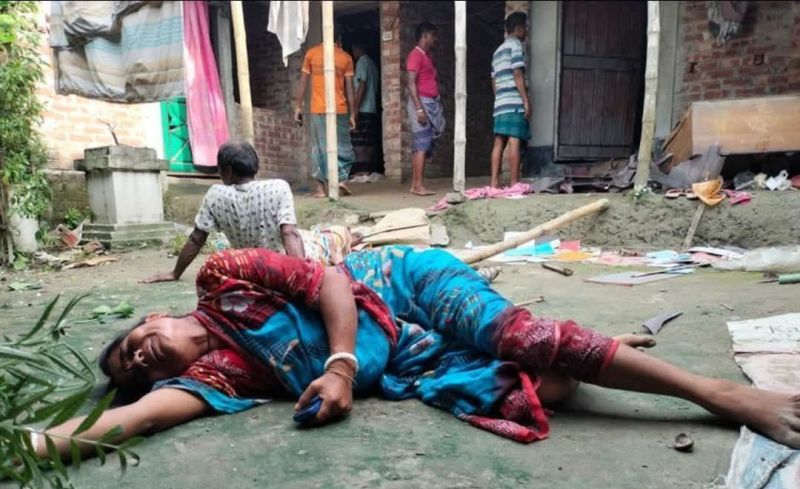With every passing day, the litany of crimes of the Mohammad Yunus-led interim regime in Bangladesh is getting more and more sordid and ghastly.
While much of Bangladesh is in the grip of state-sponsored violence, with the students-led National Citizens Party (NCP), the Jamaat-e-Islami, the Islami Chhatra Shibir and sundry other Islamist outfits committing almost daily acts of gratuitous violence, there is another kind of savagery – targeted deadly attacks against the country’s Hindu minorities – that is going practically unreported.
On July 27, a 500-600-strong mob descended on a Hindu home in Aldadpur village under Betgari union of Gangachora upazila, Rangpur district, attacking the residents before destroying other homes. The attack, which was in response to an alleged blasphemous comment on Facebook by a 17-year-old Hindu boy, lasted all night before mobs appeared the following day to create more mayhem.
Now, here is the usual trope: a police investigation found that the allegation of blasphemy, made against the Prophet, to be true. This is part of a pattern in post-August 2024 Bangladesh. Slightly over a month ago, a Hindu barber and his son were dragged out of their salon and beaten up when a customer, a Muslim, refused to pay Taka 10 for availing of services at 69-year-old Paresh Chandra Sil’s shop. This led to an altercation, following which it was alleged that Paresh Chandra had made derogatory remarks against the Prophet. Paresh Chandra and his son Bishnu Chandra were arrested and thrown in jail.
Photographic and video evidence that later emerged from Aldadpur showed an area that had been hit by a storm: warrens of destroyed walls and demolished tin roofs with Hindu women wailing and breast-beating in utter anguish and helplessness. The police made no arrests for this deadly violence. On July 28, at least 25 Hindu families of Aldadpur and nearby villages abandoned their properties to seek shelter in safer areas.
Leave alone Yunus, not even the clownish Home Ministry Adviser Lt Gen (retd) Jahangir Alam Chowdhury had little to say about the Rangpur violence. In fact, there was not so much as a squeak from any of the advisers or other senior public officials. Earlier, after every round of deadly attacks on Hindus, which would involve rape, gang rape, murder or rape followed by murder, would be explained away by halfwits and dunces in the interim government, including Yunus’ press secretary Shafiqul Alam, as retribution for being Awami League supporters.
Bangladesh’s Hindus have long been associated with the Awami League, but to explain away violence against members of the minority community as a consequence of being a particular political party’s supporters is a deceitful way to paper over crimes by members of the majority community or those who are affiliated to openly communal organisations such as the Jamaat-e-Islami, the Islami Chhatra Shibir, the Hefazat-e-Islam and the Hizbut Tehrir.
Hindus are fair targets since they are a substitute for all the anger, imagined or otherwise, piled up against India. This explains the deafening silence of most political platforms that have their own real or imagined complaints against a far larger neighbour who, till recently, was the Awami League’s main prop and benefactor.
Under Yunus, fundamentalist Islamist outfits are enjoying a free run with the police – a new crop of men drawn from the aforementioned groups – and the Army, which is not altogether free from the radical virus, unable or unwilling to act against brazen instances of communal violence.
Since August 2024, as communal violence was normalised, the Bangladesh Nationalist Party (BNP) stood on the sidelines, allowing the grisly harvest of death and destruction to continue unhindered. The BNP’s handful of Hindu leaders have maintained a deplorable silence over the unending trauma to Bangladesh’s statistically significant – 8 percent at the most – but effectively powerless community.
Hindus who fled to India in December 1992 and settled in parts of West Bengal and Kolkata, following riotous conditions in the wake of the destruction of the Babri Mosque, today draw parallels between the anti-minority pogroms then and now. At that time, BNP cadres led riotous Muslims, burning and pillaging homes and raping Hindu women, forcing them to abandon their homeland for a foreign country where, they thought, they would find some succour and security.
Today, BNP activists and supporters stand by and watch Jamaat, Shibir and other Islamists commit egregious crimes against Bangladesh’s Hindus. They do not come in the way of the communal marauders. Instead, they take the opportunity to loot and commit extortion in the countryside while party Secretary General Mirza Fakhrul Islam Alamgir claims he “turns blue” hearing about the NCP’s exactions.
The Awami League leaders, banished from the country in the wake of the August 2024 uprising, issue weak statements of outrage against the heightened communalism, with the vast majority of supporters, including truly secular elements, venting their spleen on social media.
ALSO READ: Bangladesh forms probe panel to investigate deadly jet crash at Dhaka school
Bangladesh today is in the grip of a madness never seen before in its violent and bloody history, marked by military coups and counter-coups and periodic communal convulsions. Barring remonstrations from time to time, especially in the wake of communal spillovers, New Delhi has done little to ensure the protection of Bangladesh’s minorities. The Indian central government under the current political dispensation has followed the same cynical trope. This has emboldened Bangladesh’s communal majority, which is now no longer a lunatic fringe. It is the mainstream.















